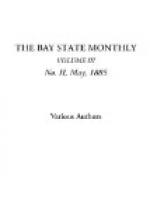The strong contrast between Sarah and Angelina Grimke was shown not only in their religious feelings, but in their manner of treating the ordinary concerns of life, and in carrying out their convictions of duty. In her humility, and in her strong reliance on the “inner light,” Sarah refused to trust her own judgment, even in the merest trifles, such as the lending of a book to a friend, postponing the writing of a letter, or sweeping a room to-day when it might be better to defer it until to-morrow. She says of this: “Perhaps to some, who have been led by higher ways than I have been into a knowledge of the truth, it may appear foolish to think of seeking direction in little things, but my mind has for a long time been in a state in which I have often felt a fear how I came in or went out, and I have found it a precious thing to stop and consult the mind of truth, and be governed thereby.”
Already the sisters had begun to reflect upon the evils of slavery. Evidences of the tenor of their reflection are furnished in their letter, and also in Sarah’s diary, which she commenced in 1828. Angelina was the first to express her abhorrence of the whole system; while Sarah’s mind, for a while at least, was too much absorbed by her disappointed hopes and her trials in the ministry to allow her to do much more than express sympathy with Angelina’s anti-slavery sentiments.
In the autumn of 1829 Angelina left Charleston never to return, and made her home with Sarah in the home of Catherine Morris. She soon became interested in Quakerism, and eventually joined the Society. The daily records of their lives and thoughts, for the ensuing four or five years, exhibit them in the enjoyment of their quiet home, visiting prisons, hospitals, and almshouses, and mourning over no sorrow or sins but their own. Angelina was leading a life of benevolent effort, too busy to admit of the pleasure of society, and her Quaker associations did not favor contact with the world’s people, or promote knowledge of the active movements in the larger reforms of the day. As to Sarah, she was suffering keenly under a great sorrow of her life.
Meanwhile, events were making; the anti-slavery question was being agitated and discussed. In February, 1831, occurred the famous debate at Lane Seminary, near Cincinnati, presided over by Dr. Lyman Beecher. The eloquence of that debate swept over the country; it flooded many hearts, and set souls aflame. Sarah Grimke also thought a little. Under date of “5th mo., 12th, 1835,” appears the following in Angelina’s diary:—
Five months have elapsed since I wrote in this diary, since which time I have become deeply interested in the subject of abolition. I had long regarded this cause as utterly hopeless, but since I have examined anti-slavery principles, I find them so full of the power of truth, that I am confident not many years will roll by before the horrible traffic in human beings will be destroyed




